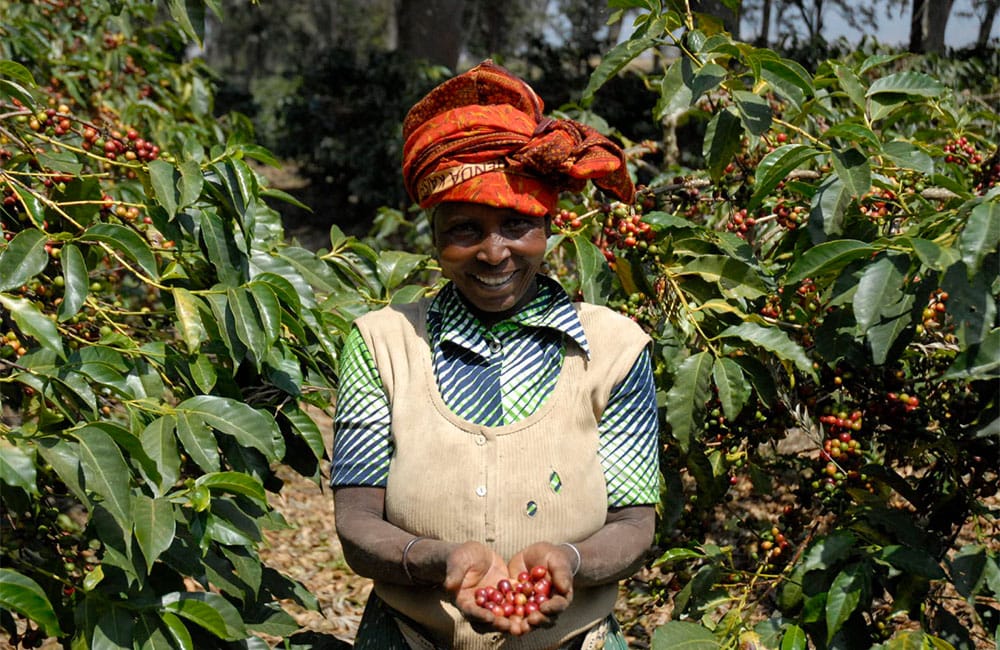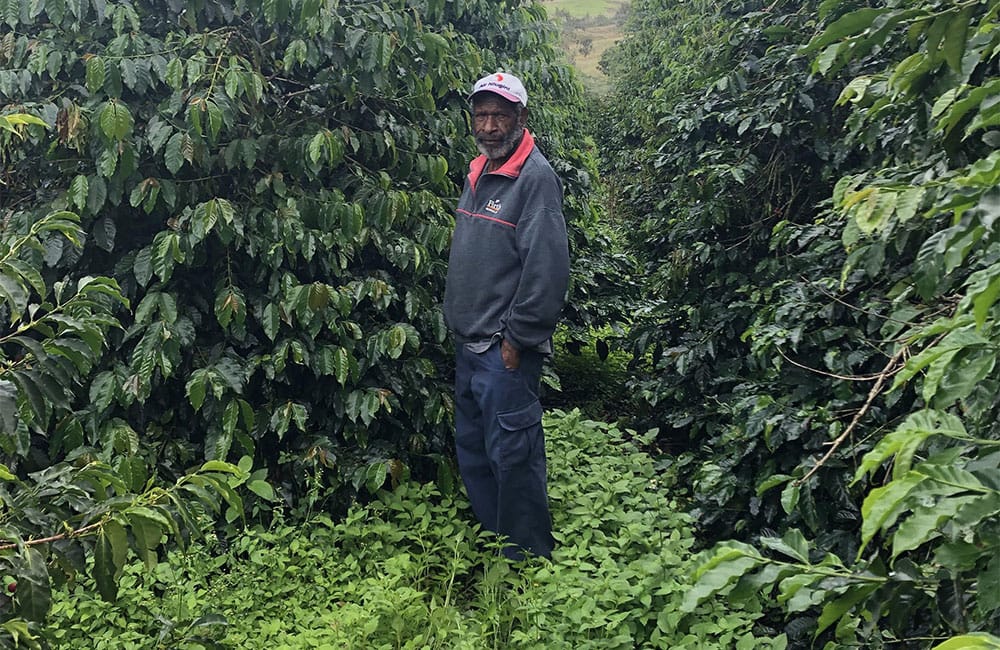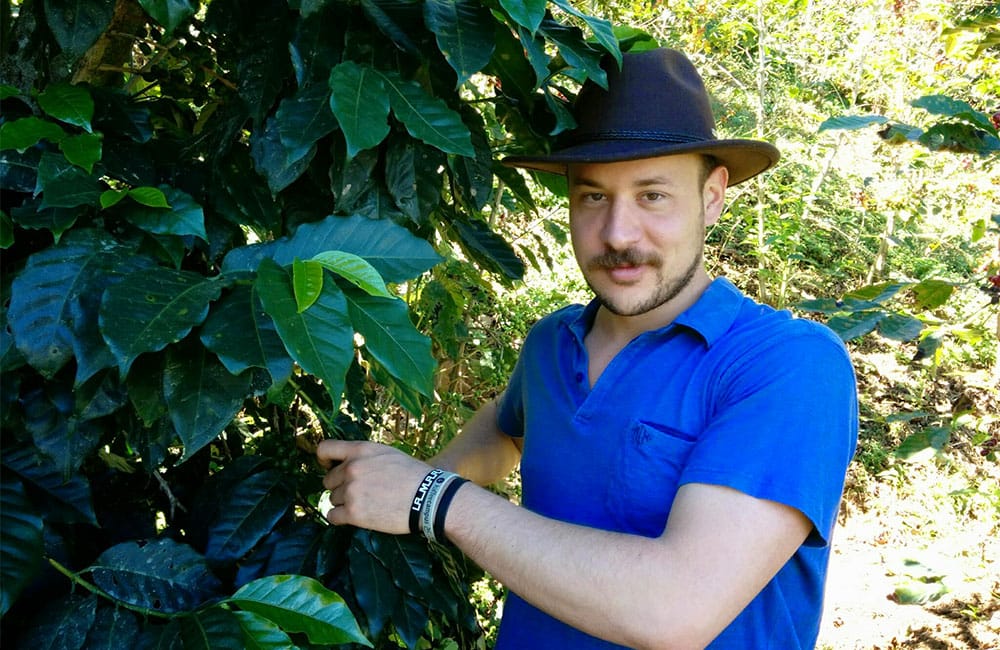Filtro & Espresso Chocolate blanco, mandarina, vainilla
| Tanzania | |
| 1.800-1.900 msnm. | |
| Arusha | |
| Lavado | |
| Leon y Aideen Christianakis |

Un café de Acacia Hills en Tanzania balanceado y dulce
Sobre Acacia Hills Estate
La vista desde la finca de Acacia Hills es increíble.
El límite norte de la finca se encuentra a lo largo del suroeste del monte Oldeani, cuyas laderas drenan agua hacia el lago Eyasi, un importante lago de agua salada en los límites del área de conservación de Ngorogoro y el Parque Nacional Serengeti.
Desde la linde de la granja se puede ver el borde del cráter Ngorogoro, un antiguo volcán colapsado cuyo fértil valle alberga ahora decenas de especies animales diferentes: desde elefantes africanos hasta leones, rinocerontes, leopardos y jirafas. El café de Biftu Gudina es procesado usando el método lavado. Una vez en la estación de lavado, los frutos son clasificados a mano y se descartan los frutos inmaduros o excesivamente maduros antes de pasarlos por la máquina despulpadora ‘eco-pulper’ Penagos (esta máquina ayuda a reducir el uso de agua excesivo). A continuación, los granos se dejan en remojo durante unas 8 horas. El tratamiento de aguas residuales de la cooperativa se basa en una forma natural de filtración a través de una parcela de pasto vetiver antes de pasar por los pozos y finalmente a la tierra. A continuación, los granos se secan al sol durante 10 a 14 días en camas africanas elevadas y se vuelven a clasificar cuidadosamente a mano.La tierra sobre la que se asienta la finca fueron anteriormente 4 granjas más pequeñas, cultivadas por primera vez por colonos alemanes en las décadas de 1930 y 1940.
El café de Biftu Gudina es procesado usando el método lavado. Una vez en la estación de lavado, los frutos son clasificados a mano y se descartan los frutos inmaduros o excesivamente maduros antes de pasarlos por la máquina despulpadora ‘eco-pulper’ Penagos (esta máquina ayuda a reducir el uso de agua excesivo). A continuación, los granos se dejan en remojo durante unas 8 horas. El tratamiento de aguas residuales de la cooperativa se basa en una forma natural de filtración a través de una parcela de pasto vetiver antes de pasar por los pozos y finalmente a la tierra. A continuación, los granos se secan al sol durante 10 a 14 días en camas africanas elevadas y se vuelven a clasificar cuidadosamente a mano.La tierra sobre la que se asienta la finca fueron anteriormente 4 granjas más pequeñas, cultivadas por primera vez por colonos alemanes en las décadas de 1930 y 1940.
En la década de 1960, las cuatro fincas se unieron bajo el nombre Acacia Hills Estate y la finca ha estado produciendo café desde entonces: en total de más de 50 años. El café de Biftu Gudina es procesado usando el método lavado. Una vez en la estación de lavado, los frutos son clasificados a mano y se descartan los frutos inmaduros o excesivamente maduros antes de pasarlos por la máquina despulpadora ‘eco-pulper’ Penagos (esta máquina ayuda a reducir el uso de agua excesivo). A continuación, los granos se dejan en remojo durante unas 8 horas. El tratamiento de aguas residuales de la cooperativa se basa en una forma natural de filtración a través de una parcela de pasto vetiver antes de pasar por los pozos y finalmente a la tierra. A continuación, los granos se secan al sol durante 10 a 14 días en camas africanas elevadas y se vuelven a clasificar cuidadosamente a mano.
El café de Biftu Gudina es procesado usando el método lavado. Una vez en la estación de lavado, los frutos son clasificados a mano y se descartan los frutos inmaduros o excesivamente maduros antes de pasarlos por la máquina despulpadora ‘eco-pulper’ Penagos (esta máquina ayuda a reducir el uso de agua excesivo). A continuación, los granos se dejan en remojo durante unas 8 horas. El tratamiento de aguas residuales de la cooperativa se basa en una forma natural de filtración a través de una parcela de pasto vetiver antes de pasar por los pozos y finalmente a la tierra. A continuación, los granos se secan al sol durante 10 a 14 días en camas africanas elevadas y se vuelven a clasificar cuidadosamente a mano. El café de Biftu Gudina es procesado usando el método lavado. Una vez en la estación de lavado, los frutos son clasificados a mano y se descartan los frutos inmaduros o excesivamente maduros antes de pasarlos por la máquina despulpadora ‘eco-pulper’ Penagos (esta máquina ayuda a reducir el uso de agua excesivo). A continuación, los granos se dejan en remojo durante unas 8 horas. El tratamiento de aguas residuales de la cooperativa se basa en una forma natural de filtración a través de una parcela de pasto vetiver antes de pasar por los pozos y finalmente a la tierra. A continuación, los granos se secan al sol durante 10 a 14 días en camas africanas elevadas y se vuelven a clasificar cuidadosamente a mano.En 2007, Leon y Aideen Christianakis, caficultores locales de Tanzania, se asociaron con un tostador estadounidense para comprar y mejorar la finca y centrarse en la producción de café de especialidad.
El café de Biftu Gudina es procesado usando el método lavado. Una vez en la estación de lavado, los frutos son clasificados a mano y se descartan los frutos inmaduros o excesivamente maduros antes de pasarlos por la máquina despulpadora ‘eco-pulper’ Penagos (esta máquina ayuda a reducir el uso de agua excesivo). A continuación, los granos se dejan en remojo durante unas 8 horas. El tratamiento de aguas residuales de la cooperativa se basa en una forma natural de filtración a través de una parcela de pasto vetiver antes de pasar por los pozos y finalmente a la tierra. A continuación, los granos se secan al sol durante 10 a 14 días en camas africanas elevadas y se vuelven a clasificar cuidadosamente a mano.En 2007, Leon y Aideen Christianakis, caficultores locales de Tanzania, se asociaron con un tostador estadounidense para comprar y mejorar la finca y centrarse en la producción de café de especialidad.
Leon y Aideen han incorporado una amplia variedad de prácticas en su producción, entre ellas el análisis del suelo, la administración de sombra y los métodos de procesamiento, para garantizar la más alta calidad posible.
La finca también cuenta con un laboratorio propio de cata que permite a Leon y Aideen analizar sus cafés. El café de Biftu Gudina es procesado usando el método lavado. Una vez en la estación de lavado, los frutos son clasificados a mano y se descartan los frutos inmaduros o excesivamente maduros antes de pasarlos por la máquina despulpadora ‘eco-pulper’ Penagos (esta máquina ayuda a reducir el uso de agua excesivo). A continuación, los granos se dejan en remojo durante unas 8 horas. El tratamiento de aguas residuales de la cooperativa se basa en una forma natural de filtración a través de una parcela de pasto vetiver antes de pasar por los pozos y finalmente a la tierra. A continuación, los granos se secan al sol durante 10 a 14 días en camas africanas elevadas y se vuelven a clasificar cuidadosamente a mano.
El café de Biftu Gudina es procesado usando el método lavado. Una vez en la estación de lavado, los frutos son clasificados a mano y se descartan los frutos inmaduros o excesivamente maduros antes de pasarlos por la máquina despulpadora ‘eco-pulper’ Penagos (esta máquina ayuda a reducir el uso de agua excesivo). A continuación, los granos se dejan en remojo durante unas 8 horas. El tratamiento de aguas residuales de la cooperativa se basa en una forma natural de filtración a través de una parcela de pasto vetiver antes de pasar por los pozos y finalmente a la tierra. A continuación, los granos se secan al sol durante 10 a 14 días en camas africanas elevadas y se vuelven a clasificar cuidadosamente a mano. El café de Biftu Gudina es procesado usando el método lavado. Una vez en la estación de lavado, los frutos son clasificados a mano y se descartan los frutos inmaduros o excesivamente maduros antes de pasarlos por la máquina despulpadora ‘eco-pulper’ Penagos (esta máquina ayuda a reducir el uso de agua excesivo). A continuación, los granos se dejan en remojo durante unas 8 horas. El tratamiento de aguas residuales de la cooperativa se basa en una forma natural de filtración a través de una parcela de pasto vetiver antes de pasar por los pozos y finalmente a la tierra. A continuación, los granos se secan al sol durante 10 a 14 días en camas africanas elevadas y se vuelven a clasificar cuidadosamente a mano.
El café de Biftu Gudina es procesado usando el método lavado. Una vez en la estación de lavado, los frutos son clasificados a mano y se descartan los frutos inmaduros o excesivamente maduros antes de pasarlos por la máquina despulpadora ‘eco-pulper’ Penagos (esta máquina ayuda a reducir el uso de agua excesivo). A continuación, los granos se dejan en remojo durante unas 8 horas. El tratamiento de aguas residuales de la cooperativa se basa en una forma natural de filtración a través de una parcela de pasto vetiver antes de pasar por los pozos y finalmente a la tierra. A continuación, los granos se secan al sol durante 10 a 14 días en camas africanas elevadas y se vuelven a clasificar cuidadosamente a mano.
El cultivo del café
La finca cultiva principalmente las variedades Bourbon y Kent y ha estado experimentando con la posibilidad de Geisha, Pacamara y Castillo en el clima de Tanzania. La finca cuenta con la mayor altitud de todas las fincas cafetaleras de la región y, para aprovechar al máximo el potencial de estas variedades, se ha plantado Geisha y Pacamara en la mayor altitud de la finca, a unos 1.900 metros sobre el nivel del mar. El café de Biftu Gudina es procesado usando el método lavado. Una vez en la estación de lavado, los frutos son clasificados a mano y se descartan los frutos inmaduros o excesivamente maduros antes de pasarlos por la máquina despulpadora ‘eco-pulper’ Penagos (esta máquina ayuda a reducir el uso de agua excesivo). A continuación, los granos se dejan en remojo durante unas 8 horas. El tratamiento de aguas residuales de la cooperativa se basa en una forma natural de filtración a través de una parcela de pasto vetiver antes de pasar por los pozos y finalmente a la tierra. A continuación, los granos se secan al sol durante 10 a 14 días en camas africanas elevadas y se vuelven a clasificar cuidadosamente a mano.
El café de Biftu Gudina es procesado usando el método lavado. Una vez en la estación de lavado, los frutos son clasificados a mano y se descartan los frutos inmaduros o excesivamente maduros antes de pasarlos por la máquina despulpadora ‘eco-pulper’ Penagos (esta máquina ayuda a reducir el uso de agua excesivo). A continuación, los granos se dejan en remojo durante unas 8 horas. El tratamiento de aguas residuales de la cooperativa se basa en una forma natural de filtración a través de una parcela de pasto vetiver antes de pasar por los pozos y finalmente a la tierra. A continuación, los granos se secan al sol durante 10 a 14 días en camas africanas elevadas y se vuelven a clasificar cuidadosamente a mano. El café de Biftu Gudina es procesado usando el método lavado. Una vez en la estación de lavado, los frutos son clasificados a mano y se descartan los frutos inmaduros o excesivamente maduros antes de pasarlos por la máquina despulpadora ‘eco-pulper’ Penagos (esta máquina ayuda a reducir el uso de agua excesivo). A continuación, los granos se dejan en remojo durante unas 8 horas. El tratamiento de aguas residuales de la cooperativa se basa en una forma natural de filtración a través de una parcela de pasto vetiver antes de pasar por los pozos y finalmente a la tierra. A continuación, los granos se secan al sol durante 10 a 14 días en camas africanas elevadas y se vuelven a clasificar cuidadosamente a mano.
El café de Biftu Gudina es procesado usando el método lavado. Una vez en la estación de lavado, los frutos son clasificados a mano y se descartan los frutos inmaduros o excesivamente maduros antes de pasarlos por la máquina despulpadora ‘eco-pulper’ Penagos (esta máquina ayuda a reducir el uso de agua excesivo). A continuación, los granos se dejan en remojo durante unas 8 horas. El tratamiento de aguas residuales de la cooperativa se basa en una forma natural de filtración a través de una parcela de pasto vetiver antes de pasar por los pozos y finalmente a la tierra. A continuación, los granos se secan al sol durante 10 a 14 días en camas africanas elevadas y se vuelven a clasificar cuidadosamente a mano.
Cosecha y poscosecha
Las cerezas se seleccionan a mano de forma cuidadosa antes de ser llevadas a la estación de lavado de la finca. Un nuevo molino Penagos clasifica las cerezas a medida que se despulpan. Luego, el café fermenta en seco durante 12-18 horas (dependiendo de la temperatura ambiente) antes de ser lavado con agua limpia y dejado secar en camas elevadas africanas durante 10-14 días. El café de Biftu Gudina es procesado usando el método lavado. Una vez en la estación de lavado, los frutos son clasificados a mano y se descartan los frutos inmaduros o excesivamente maduros antes de pasarlos por la máquina despulpadora ‘eco-pulper’ Penagos (esta máquina ayuda a reducir el uso de agua excesivo). A continuación, los granos se dejan en remojo durante unas 8 horas. El tratamiento de aguas residuales de la cooperativa se basa en una forma natural de filtración a través de una parcela de pasto vetiver antes de pasar por los pozos y finalmente a la tierra. A continuación, los granos se secan al sol durante 10 a 14 días en camas africanas elevadas y se vuelven a clasificar cuidadosamente a mano.Tradicionalmente, en la finca se dejaba secar los granos de café directamente al sol. En los últimos años, Leon, Aideen y su equipo han estado experimentando con el uso de redes de sombra para reducir los tiempos de secado. Leon y Aideen saben que los próximos pasos hacia la mejora de la calidad se encuentran en los pequeños detalles y están comprometidos a experimentar y perfeccionar sus métodos de procesamiento.
El café de Biftu Gudina es procesado usando el método lavado. Una vez en la estación de lavado, los frutos son clasificados a mano y se descartan los frutos inmaduros o excesivamente maduros antes de pasarlos por la máquina despulpadora ‘eco-pulper’ Penagos (esta máquina ayuda a reducir el uso de agua excesivo). A continuación, los granos se dejan en remojo durante unas 8 horas. El tratamiento de aguas residuales de la cooperativa se basa en una forma natural de filtración a través de una parcela de pasto vetiver antes de pasar por los pozos y finalmente a la tierra. A continuación, los granos se secan al sol durante 10 a 14 días en camas africanas elevadas y se vuelven a clasificar cuidadosamente a mano.Tradicionalmente, en la finca se dejaba secar los granos de café directamente al sol. En los últimos años, Leon, Aideen y su equipo han estado experimentando con el uso de redes de sombra para reducir los tiempos de secado. Leon y Aideen saben que los próximos pasos hacia la mejora de la calidad se encuentran en los pequeños detalles y están comprometidos a experimentar y perfeccionar sus métodos de procesamiento. El café de Biftu Gudina es procesado usando el método lavado. Una vez en la estación de lavado, los frutos son clasificados a mano y se descartan los frutos inmaduros o excesivamente maduros antes de pasarlos por la máquina despulpadora ‘eco-pulper’ Penagos (esta máquina ayuda a reducir el uso de agua excesivo). A continuación, los granos se dejan en remojo durante unas 8 horas. El tratamiento de aguas residuales de la cooperativa se basa en una forma natural de filtración a través de una parcela de pasto vetiver antes de pasar por los pozos y finalmente a la tierra. A continuación, los granos se secan al sol durante 10 a 14 días en camas africanas elevadas y se vuelven a clasificar cuidadosamente a mano.
El café de Biftu Gudina es procesado usando el método lavado. Una vez en la estación de lavado, los frutos son clasificados a mano y se descartan los frutos inmaduros o excesivamente maduros antes de pasarlos por la máquina despulpadora ‘eco-pulper’ Penagos (esta máquina ayuda a reducir el uso de agua excesivo). A continuación, los granos se dejan en remojo durante unas 8 horas. El tratamiento de aguas residuales de la cooperativa se basa en una forma natural de filtración a través de una parcela de pasto vetiver antes de pasar por los pozos y finalmente a la tierra. A continuación, los granos se secan al sol durante 10 a 14 días en camas africanas elevadas y se vuelven a clasificar cuidadosamente a mano. El café de Biftu Gudina es procesado usando el método lavado. Una vez en la estación de lavado, los frutos son clasificados a mano y se descartan los frutos inmaduros o excesivamente maduros antes de pasarlos por la máquina despulpadora ‘eco-pulper’ Penagos (esta máquina ayuda a reducir el uso de agua excesivo). A continuación, los granos se dejan en remojo durante unas 8 horas. El tratamiento de aguas residuales de la cooperativa se basa en una forma natural de filtración a través de una parcela de pasto vetiver antes de pasar por los pozos y finalmente a la tierra. A continuación, los granos se secan al sol durante 10 a 14 días en camas africanas elevadas y se vuelven a clasificar cuidadosamente a mano.
El café de Biftu Gudina es procesado usando el método lavado. Una vez en la estación de lavado, los frutos son clasificados a mano y se descartan los frutos inmaduros o excesivamente maduros antes de pasarlos por la máquina despulpadora ‘eco-pulper’ Penagos (esta máquina ayuda a reducir el uso de agua excesivo). A continuación, los granos se dejan en remojo durante unas 8 horas. El tratamiento de aguas residuales de la cooperativa se basa en una forma natural de filtración a través de una parcela de pasto vetiver antes de pasar por los pozos y finalmente a la tierra. A continuación, los granos se secan al sol durante 10 a 14 días en camas africanas elevadas y se vuelven a clasificar cuidadosamente a mano.
El café en Tanzania
Las raíces del café en Tanzania se remontan a través de la historia a la tribu Haya del noroeste de Tanzania en el siglo XVI. Tras el dominio colonial alemán y luego británico, la industria del café de Tanzania ha experimentado muchas transformaciones y ajustes en un esfuerzo por crear la industria del café más equitativa, rentable y de alta calidad posible. El café en Tanzania fue cultivado casi exclusivamente en el norte durante mucho tiempo. Las regiones de Kilimanjaro, Arusha, Tarime, Kagera, Kigoma y Karatu/Ngorongoro son apreciadas por sus condiciones ideales de cultivo de Arábica. El café de Biftu Gudina es procesado usando el método lavado. Una vez en la estación de lavado, los frutos son clasificados a mano y se descartan los frutos inmaduros o excesivamente maduros antes de pasarlos por la máquina despulpadora ‘eco-pulper’ Penagos (esta máquina ayuda a reducir el uso de agua excesivo). A continuación, los granos se dejan en remojo durante unas 8 horas. El tratamiento de aguas residuales de la cooperativa se basa en una forma natural de filtración a través de una parcela de pasto vetiver antes de pasar por los pozos y finalmente a la tierra. A continuación, los granos se secan al sol durante 10 a 14 días en camas africanas elevadas y se vuelven a clasificar cuidadosamente a mano.Durante un tiempo, la producción de café estaba tan concentrada en el norte que Moshi, un municipio del norte, era el único centro para toda la molienda y venta de café. Las operaciones en Moshi llegaron a proporciones verdaderamente masivas en la década de 1950 y principios de 1960. Dado que tanto Tanzania, Kenia y Burundi estuvieron bajo el dominio británico en las décadas de la posguerra, Moshi fue el segundo centro de molienda y ventas (después de Nairobi, Kenia) para la producción de café británica. En los últimos años, el cultivo de café se ha extendido hacia el sur. Además de las históricas regiones del norte, ahora también se cultiva café en las regiones del sur de Ruvuma y Mbeya / Mbozi. La mayor parte de la expansión del cultivo de café en el sur se produjo en las décadas de 1970 y 1980 y fue alentada por dos proyectos apoyados por patrocinadores europeos. En un giro irónico, hoy en día entre el 75 y el 85% de la producción total de café en Tanzania proviene de fincas en el sur del país.
El café de Biftu Gudina es procesado usando el método lavado. Una vez en la estación de lavado, los frutos son clasificados a mano y se descartan los frutos inmaduros o excesivamente maduros antes de pasarlos por la máquina despulpadora ‘eco-pulper’ Penagos (esta máquina ayuda a reducir el uso de agua excesivo). A continuación, los granos se dejan en remojo durante unas 8 horas. El tratamiento de aguas residuales de la cooperativa se basa en una forma natural de filtración a través de una parcela de pasto vetiver antes de pasar por los pozos y finalmente a la tierra. A continuación, los granos se secan al sol durante 10 a 14 días en camas africanas elevadas y se vuelven a clasificar cuidadosamente a mano.Durante un tiempo, la producción de café estaba tan concentrada en el norte que Moshi, un municipio del norte, era el único centro para toda la molienda y venta de café. Las operaciones en Moshi llegaron a proporciones verdaderamente masivas en la década de 1950 y principios de 1960. Dado que tanto Tanzania, Kenia y Burundi estuvieron bajo el dominio británico en las décadas de la posguerra, Moshi fue el segundo centro de molienda y ventas (después de Nairobi, Kenia) para la producción de café británica. En los últimos años, el cultivo de café se ha extendido hacia el sur. Además de las históricas regiones del norte, ahora también se cultiva café en las regiones del sur de Ruvuma y Mbeya / Mbozi. La mayor parte de la expansión del cultivo de café en el sur se produjo en las décadas de 1970 y 1980 y fue alentada por dos proyectos apoyados por patrocinadores europeos. En un giro irónico, hoy en día entre el 75 y el 85% de la producción total de café en Tanzania proviene de fincas en el sur del país. El café de Biftu Gudina es procesado usando el método lavado. Una vez en la estación de lavado, los frutos son clasificados a mano y se descartan los frutos inmaduros o excesivamente maduros antes de pasarlos por la máquina despulpadora ‘eco-pulper’ Penagos (esta máquina ayuda a reducir el uso de agua excesivo). A continuación, los granos se dejan en remojo durante unas 8 horas. El tratamiento de aguas residuales de la cooperativa se basa en una forma natural de filtración a través de una parcela de pasto vetiver antes de pasar por los pozos y finalmente a la tierra. A continuación, los granos se secan al sol durante 10 a 14 días en camas africanas elevadas y se vuelven a clasificar cuidadosamente a mano.
El café de Biftu Gudina es procesado usando el método lavado. Una vez en la estación de lavado, los frutos son clasificados a mano y se descartan los frutos inmaduros o excesivamente maduros antes de pasarlos por la máquina despulpadora ‘eco-pulper’ Penagos (esta máquina ayuda a reducir el uso de agua excesivo). A continuación, los granos se dejan en remojo durante unas 8 horas. El tratamiento de aguas residuales de la cooperativa se basa en una forma natural de filtración a través de una parcela de pasto vetiver antes de pasar por los pozos y finalmente a la tierra. A continuación, los granos se secan al sol durante 10 a 14 días en camas africanas elevadas y se vuelven a clasificar cuidadosamente a mano.









